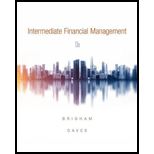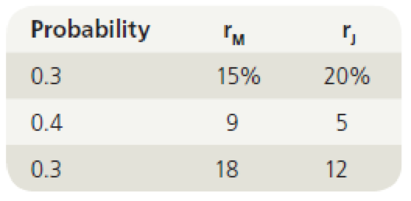
Intermediate Financial Management (MindTap Course List)
13th Edition
ISBN: 9781337395083
Author: Eugene F. Brigham, Phillip R. Daves
Publisher: Cengage Learning
expand_more
expand_more
format_list_bulleted
Concept explainers
Textbook Question
Chapter 2, Problem 6P
The market and Stock J have the following probability distributions:

- a. Calculate the expected
rates of return for the market and Stock J. - b. Calculate the standard deviations for the market and Stock J.
Expert Solution & Answer
Want to see the full answer?
Check out a sample textbook solution
Students have asked these similar questions
Use the binomial method to determine the value of an American Put option
at time t = 0. The option expires at time t = T = 1/2 and has exercise price
E = 55. The current value of the underlying is S(0) = 50 with the underlying
paying continuous dividends at the rate D = 0.05. The interest rate is r = 0.3.
Use a time step of St = 1/6. Consider the case of p = 1/2 and suppose the
volatility is σ = 0.3. Perform all calculations using a minimum of 4 decimal
places of accuracy.
=
Consider a European chooser option with exercise price E₁ and expiry date
T₁ where the relevant put and call options, which depend on the value of the
same underlying asset S, have the same exercise price E2 and expiry date T₂.
Determine, in terms of other elementary options, the value of the chooser option
for the special case when T₁ = T2. Clearly define all notation that you use.
The continuous conditional probability density function pc(S, t; S', t') for a risk
neutral lognormal random walk is given by
Pc(S, t; S', t') =
1
σS'√2π(t' - t)
-
(log(S/S) (ro²)(t − t)]
exp
202 (t't)
In the binomial method, the value of the underlying is Sm at time step môt
and the value of the underlying at time step (m + 1)St is Sm+1. For this case
evaluate
Ec[(Sm+1)k|Sm] = [°° (S')*pc(S™, mdt; S', (m + 1)8t)dS'
showing all steps, where k is a positive integer with k ≥ 1.
You may assume that
1
e
(x-n)2
2s2dx = 1
for all real numbers n and s with s > 0.
Chapter 2 Solutions
Intermediate Financial Management (MindTap Course List)
Ch. 2 - Prob. 2QCh. 2 - Security A has an expected return of 7%, a...Ch. 2 - Prob. 4QCh. 2 - Prob. 5QCh. 2 - Your investment club has only two stocks in its...Ch. 2 - AA Corporations stock has a beta of 0.8. The...Ch. 2 - Suppose that the risk-free rate is 5% and that the...Ch. 2 - An analyst has modeled the stock of a company...Ch. 2 - Prob. 5PCh. 2 - The market and Stock J have the following...
Ch. 2 - Prob. 7PCh. 2 - Prob. 8PCh. 2 - Prob. 9PCh. 2 - Prob. 10PCh. 2 - Prob. 11PCh. 2 - Stock R has a beta of 1.5, Stock S has a beta of...Ch. 2 - Prob. 13PCh. 2 - You have observed the following returns over time:...Ch. 2 - Prob. 1MCCh. 2 - Prob. 2MCCh. 2 - Prob. 3MCCh. 2 - What is the stand-alone risk? Use the scenario...Ch. 2 - Prob. 5MCCh. 2 - Prob. 6MCCh. 2 - Prob. 7MCCh. 2 - Prob. 8MCCh. 2 - Prob. 9MCCh. 2 - Prob. 10MCCh. 2 - Prob. 11MCCh. 2 - Prob. 12MCCh. 2 - Prob. 13MCCh. 2 - Prob. 14MCCh. 2 - Prob. 15MCCh. 2 - Prob. 16MCCh. 2 - Prob. 17MCCh. 2 - Prob. 18MC
Knowledge Booster
Learn more about
Need a deep-dive on the concept behind this application? Look no further. Learn more about this topic, finance and related others by exploring similar questions and additional content below.Similar questions
- John and Jane Doe, a married couple filing jointly, have provided you with their financial information for the year, including details of federal income tax withheld. They need assistance in preparing their tax return. W-2 Income: John earns $150,000 with $35,000 withheld for federal income tax. Jane earns $85,000 with $15,500 withheld for federal income tax. Interest Income: They received $2500 in interest from a savings account, with no tax withheld. Child Tax Credit: They have two children under the age of 17. Mortgage Interest: Paid $28,000 in mortgage interest on their primary residence. Property Taxes: Paid $4,800 in property taxes on their primary residence. Charitable Donations: Donated $22,000 to qualifying charitable organizations. Other Deductions: They have no other deductions to claim. You will gather the appropriate information and complete the forms provided in Blackboard (1040, Schedule A, and Schedule B in preparation of their tax file.arrow_forwardOn the issue date, you bought a 20-year maturity, 5.85% semi-annual coupon bond. The bond then sold at YTM of 6.25%. Now, 5 years later, the similar bond sells at YTM of 5.25%. If you hold the bond now, what is your realized rate of return for the 5-year holding period?arrow_forwardBond Valuation with Semiannual Payments Renfro Rentals has issued bonds that have an 11% coupon rate, payable semiannually. The bonds mature in 17 years, have a face value of $1,000, and a yield to maturity of 9.5%. What is the price of the bonds? Round your answer to the nearest cent.arrow_forward
- analyze at least three financial banking products from both the liability side (like time deposits, fixed income, stocks, structure products, etc). You will need to examine aspects such as liquidity, risk, and profitability from a company and an individual point of view.arrow_forwardHow a does researcher ensure that consulting recommendations are data-driven? What does make it effective, and sustainable? Please help explain and give the example How does DMAC help researchers to improve their business processes? How to establish feedback loops for ongoing refinement. Please give the examplesarrow_forwardDon't used hand raiting and don't used Ai solutionarrow_forward
- Explain what the business model of payday lenders, title pawn lenders, and “credit approved” used car dealers.arrow_forwardThe current NPV of a $30 million bond with 9% interest, 8% coupon rate, and discounted at $95arrow_forwardCould you please help to explain the DMAIC phases and how a researcher would use them to conduct a consulting project? What is a measure process performance and how to analyze the process? What is an improve process performance and how the control improves process and future process performance?arrow_forward
- Consider the two stocks below. Graph the frontier of combinations of the two stocks. Show the effect on the frontier of varying the correlation from −1 to +1. 1 2 3 Mean A B C D TWO STOCKS Varying the correlation coefficient Stock A Stock B 3.00% 8.00% 4 Sigma 15.00% 22.00% 5 Correlation 0.3000 Farrow_forwardLindsay is 30 years old and has a new job in web development. She wants to make sure that she is financially sound by the age of 55, so she plans to invest the same amount into a retirement account at the end of every year for the next 25 years. (a) Construct a data table in Excel that will show Lindsay the balance of her retirement account for various levels of annual investment and return. If Lindsay invests $10,000 at return of 6%, what would be the balance at the end of the 25th year? Note that because Lindsay invests at the end of the year, there is no interest earned on the contribution for the year in which she contributes. Round your answer to a whole dollar amount. $ (b) Develop a two-way table for annual investment amounts of $5,000 to $20,000 in increments of $1,000 and for returns of 0% to 12% in increments of 1%. From the 2-way table, what are the minimum annual investments Lindsay must contribute for annual rates ranging from 6% to 11%, if she wants to…arrow_forwardDoes Airbnb have any impaired assets? If so, what are they?arrow_forward
arrow_back_ios
SEE MORE QUESTIONS
arrow_forward_ios
Recommended textbooks for you
 Intermediate Financial Management (MindTap Course...FinanceISBN:9781337395083Author:Eugene F. Brigham, Phillip R. DavesPublisher:Cengage Learning
Intermediate Financial Management (MindTap Course...FinanceISBN:9781337395083Author:Eugene F. Brigham, Phillip R. DavesPublisher:Cengage Learning
 Pfin (with Mindtap, 1 Term Printed Access Card) (...FinanceISBN:9780357033609Author:Randall Billingsley, Lawrence J. Gitman, Michael D. JoehnkPublisher:Cengage Learning
Pfin (with Mindtap, 1 Term Printed Access Card) (...FinanceISBN:9780357033609Author:Randall Billingsley, Lawrence J. Gitman, Michael D. JoehnkPublisher:Cengage Learning

Intermediate Financial Management (MindTap Course...
Finance
ISBN:9781337395083
Author:Eugene F. Brigham, Phillip R. Daves
Publisher:Cengage Learning



Pfin (with Mindtap, 1 Term Printed Access Card) (...
Finance
ISBN:9780357033609
Author:Randall Billingsley, Lawrence J. Gitman, Michael D. Joehnk
Publisher:Cengage Learning
Portfolio return, variance, standard deviation; Author: MyFinanceTeacher;https://www.youtube.com/watch?v=RWT0kx36vZE;License: Standard YouTube License, CC-BY